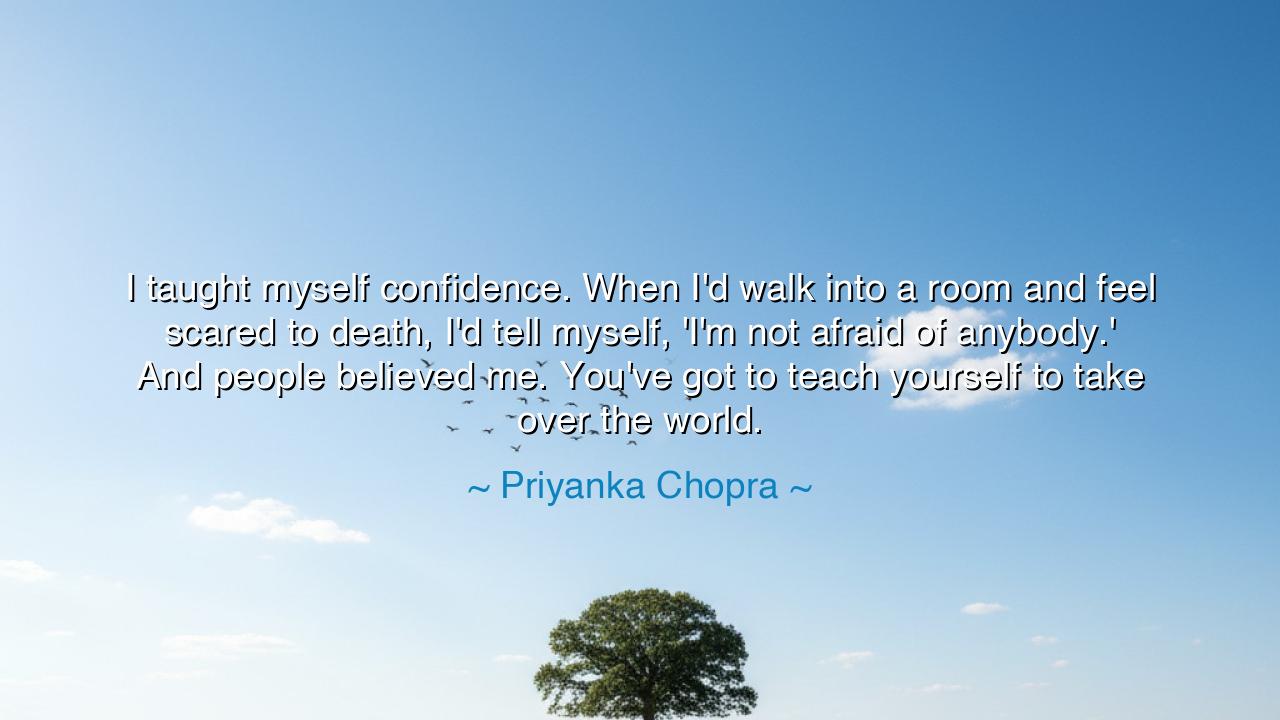
I taught myself confidence. When I'd walk into a room and feel
I taught myself confidence. When I'd walk into a room and feel scared to death, I'd tell myself, 'I'm not afraid of anybody.' And people believed me. You've got to teach yourself to take over the world.






The words of Priyanka Chopra — “I taught myself confidence. When I’d walk into a room and feel scared to death, I’d tell myself, ‘I’m not afraid of anybody.’ And people believed me. You’ve got to teach yourself to take over the world.” — resound with the power of self-creation. In them lies not arrogance, but a sacred truth: that courage is not always born, but forged — that the greatest victories begin not in the outer world, but within the mind and spirit of the individual. Chopra, who rose from modest beginnings in India to become an international figure of strength and success, speaks here as one who has learned the ancient art of mastery over fear. Her words are not merely advice; they are a commandment to all who aspire to rise beyond doubt and circumstance.
In the ancient world, such wisdom was known as self-discipline of the soul — the ability to rule one’s own emotions and thoughts as a king rules his kingdom. The philosophers of Greece, the warriors of Rome, the poets of India — all taught that before one can lead others, one must first lead oneself. Chopra’s declaration, “I taught myself confidence,” is a modern echo of this eternal principle. It reminds us that confidence is not a gift bestowed by fortune or the approval of others, but a skill to be trained, a muscle strengthened through will and repetition. Even when she entered rooms trembling with fear, she declared mastery over herself — and the world believed, because she believed first.
The origin of this quote can be traced to Chopra’s own journey — one filled with both triumph and trial. Before she became an icon, she was simply a young woman standing in a world that often doubted her place in it. From the small town of Bareilly, India, she rose to global prominence as Miss World, a film star, and an ambassador of South Asian excellence in Western entertainment. Yet behind the glamour lay a series of battles — against insecurity, prejudice, and expectation. Her statement reveals the truth that every confident person, every great leader, has once stood trembling before the crowd. The difference lies in what they whisper to themselves in that moment. She chose not to bow before fear but to command herself into courage.
Such strength has been the mark of greatness across all ages. Consider Alexander the Great, who as a boy was said to tremble before his first battle. Yet his tutor, Aristotle, taught him the philosophy of self-rule — to master fear through thought and purpose. Alexander, too, learned to act brave before he felt brave, until courage became his nature. Or recall Eleanor Roosevelt, who confessed that she was terrified of speaking before others, yet taught herself to act boldly until her presence could calm nations. These figures, like Chopra, understood that fear loses its power the moment one chooses action over surrender. Confidence, then, is not the absence of fear — it is the decision to defy it.
Chopra’s words — “You’ve got to teach yourself to take over the world” — are not a call to domination, but to self-mastery and ambition. To “take over the world” is to refuse the chains of limitation, to rise from the silence of doubt into the fullness of one’s own power. It is to realize that no one will hand you the keys to destiny — you must carve them yourself, with your own hands, your own faith. The ancients would call this the heroic path — not the conquest of others, but the conquest of the self. Every empire of worth begins in the heart that dares to believe it can be built.
Yet there is tenderness in her wisdom, too. To “teach yourself” implies patience, discipline, and love — the understanding that growth is a process, not an instant transformation. Like a child learning to walk, one must stumble, fall, and rise again. Chopra reminds us that strength is a learned habit. Every moment of self-doubt is an opportunity to teach ourselves something new — to rewrite our inner story. Confidence, then, is not a mask to deceive the world, but a mirror reflecting what we have trained ourselves to become.
The lesson of her words is clear and timeless: fear is natural, but submission to it is a choice. Each of us, no matter our birth or circumstance, can teach ourselves to rise. Begin with the smallest acts — speak when silence tempts you, stand tall when you wish to shrink, say “I am not afraid” even when your heart trembles. In time, these acts become truth. Confidence, like fire, begins as a spark — and when tended with faith and persistence, it becomes a flame that can light the way for others.
So let Priyanka Chopra’s words be your guide: “I taught myself confidence… I deal in hope.” Do not wait for the world to believe in you — believe first in yourself. Walk into every room as if the universe itself stands behind you. Teach your heart to roar when it wishes to whisper. For the world belongs not to the fearless, but to those who choose courage again and again, until fear itself learns to bow before them.






AAdministratorAdministrator
Welcome, honored guests. Please leave a comment, we will respond soon